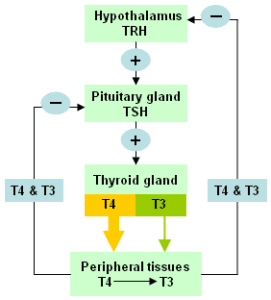Have you felt extremely tired and fatigued recently for no reason?
Have you been gaining weight even though it seems your appetite has decreased?
Have you been feeling more cold, more constipated, and more forgetful?
Has your skin and your hair been feeling dryer than usual?
Have you been recently diagnosed with a thyroid disorder?
What is a thyroid? The thyroid gland is located on the front part of the neck below the thyroid cartilage (Adam’s apple). The gland produces thyroid hormones (T3 and T4), which affect the function of almost every system in the body. In a child, thyroid hormones are responsible for normal growth and development. In an adult, the major role is to maintain a stable metabolism, i.e. to regulate body energy, the body’s use of other hormones and vitamins, and the growth and maturation of body tissues. Thyroid hormone is stored in the gland and the blood and is constantly available. It is released from the gland (secreted) by TSH (thyroid stimulating hormone – hormone produced by pituitary gland). You can have too much thyroid hormone – hyperthyroidism or too little thyroid hormone – hypothyroidism.
Hypothyroidism is a decrease in thyroid hormone production. The primary cause for hypothyroidism in the United States is an autoimmune thyroid disease called Hashimoto, it can also be caused by radiation treatment, surgical removal of the thyroid gland, or iodine deficiency. In the United States and other developed countries, we eat a lot of food containing iodine. Worldwide, iodine deficiency remains the primary cause. In Hashimoto, the immune system attacks the thyroid gland enlarging it, causing a decrease in thyroid hormone production. When hormone levels are low, the brain is stimulated to produce TRH (thyroid releasing hormone), which stimulates the pituitary to make TSH, which then should signal the thyroid gland to make the hormones needed. An elevated TSH level is a sign of hypothyroidism.

Prevalence: Hypothyroidism occurs in 1.5% to 2% of women and 0.2% of men, and it increases with advanced age.
Testing: To test for hypothyroidism, a TSH level is checked by drawing blood. The normal range of TSH in the blood is 0.4-4.2 mIU/L. A TSH reading above 4.0 mIU/L is considered high (elevated) and a sign of hypothyroidism.
Bringing Medication Education Near You
Treatment: The thyroid hormone affects growth and the maturing of tissues. It is involved in normal growth, metabolism, and development. The goals of pharmacotherapy are to reduce morbidity and to prevent complications. Thyroid hormone is administered to supplement or replace natural hormone production. Levothyroxine (LT4 – synthetic T4) is generally considered to be the treatment of choice for patients with hypothyroidism. The brand name of Levothyroxine is Synthroid, Levoxyl, Levothroid, Unithroid, and Tirosint. Liothyronine, brand name Cytomel (LT3 – synthetic T3), is not intended for use as sole maintenance therapy. Desiccated thyroid contains T3 and T4 hormones in a 1:4 ratio. The brand names are Armour Thyroid, Nature-Throid, and Westhroid. Clinical benefits begin in 3-5 days and level off after 4-6 weeks. Achieving a TSH level within the reference range may take several months
Levothyroxine
- Take 30-60 minutes before breakfast, on an empty stomach, with a full glass of water. If eaten, wait 4 hours after evening meal.
- You should take your dose the same way each day and at the same time.
- Separate iron pills, antacids, or vitamins that have aluminum, calcium, or magnesium for four hours.
- Side effects: if levels are too high – rapid heartbeat or tremors, irritability, or feverish. If levels are too low – tired, depressed, sensitivity to the cold.
- Pregnant women with overt hypothyroidism should receive levothyroxine replacement therapy with the dose titrated to achieve a TSH concentration.
Diet and Exercise: The World Health Organization (WHO) recommends a daily dietary iodine intake of 150 µg for adults, 200 µg for pregnant and lactating women, and 50-120 µg for children.
Severe Hypothyroidism: Myxedema coma is a severe form of hypothyroidism that most commonly occurs in individuals with undiagnosed or untreated hypothyroidism who are subjected to an external stress. It results in an altered mental status, hypothermia, bradycardia, hypercarbia, and hyponatremia. Cardiomegaly, pericardial effusion, cardiogenic shock, and ascites may be present. Myxedema coma most commonly occurs in individuals with undiagnosed or untreated hypothyroidism who are subjected to an external stress, such as low temperature, infection, myocardial infarction, stroke, or medical intervention (i.e. surgery or hypnotic drugs).
GO GET CHECKED!!! Click To Schedule RxPowerHour Today!

Leave A Comment